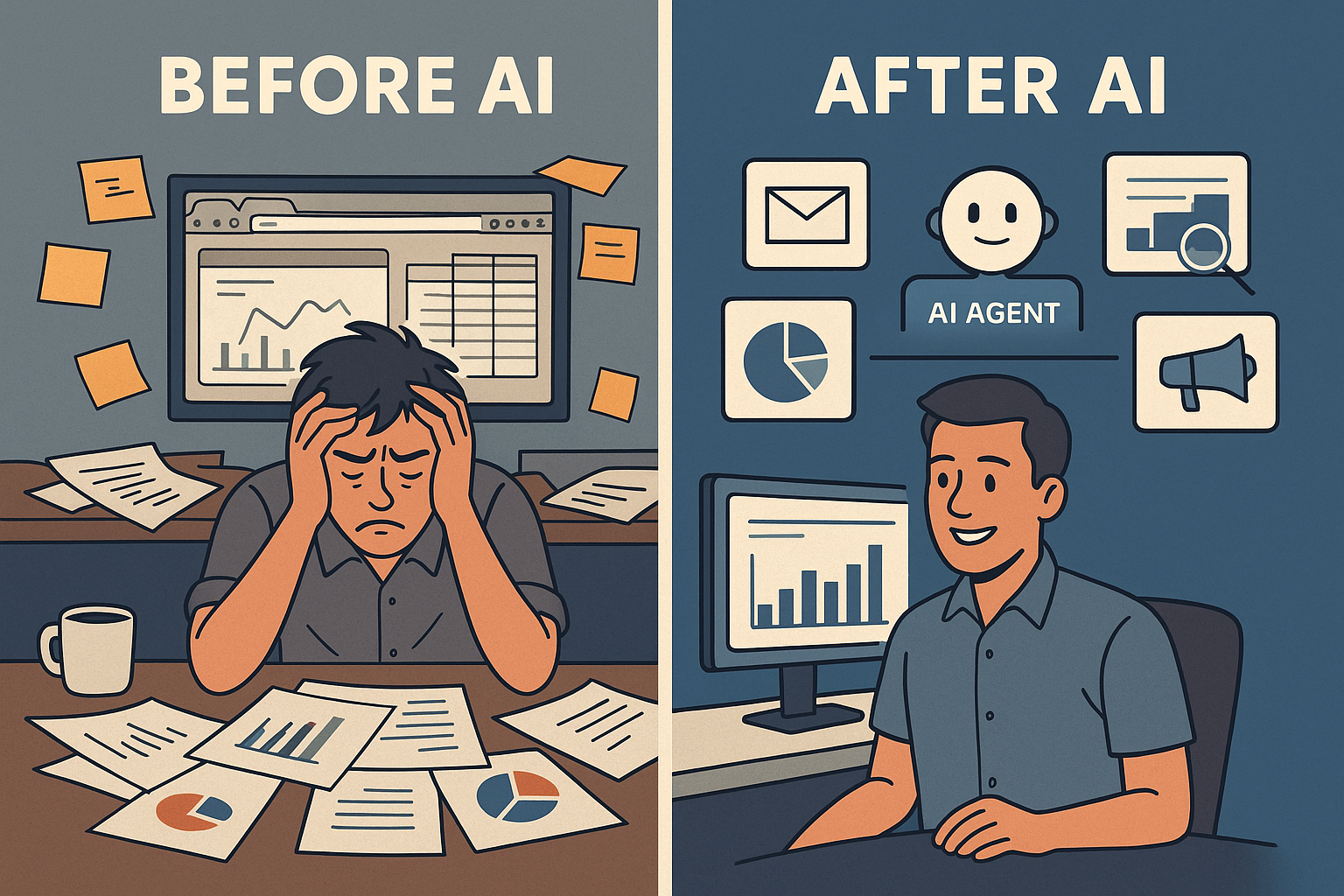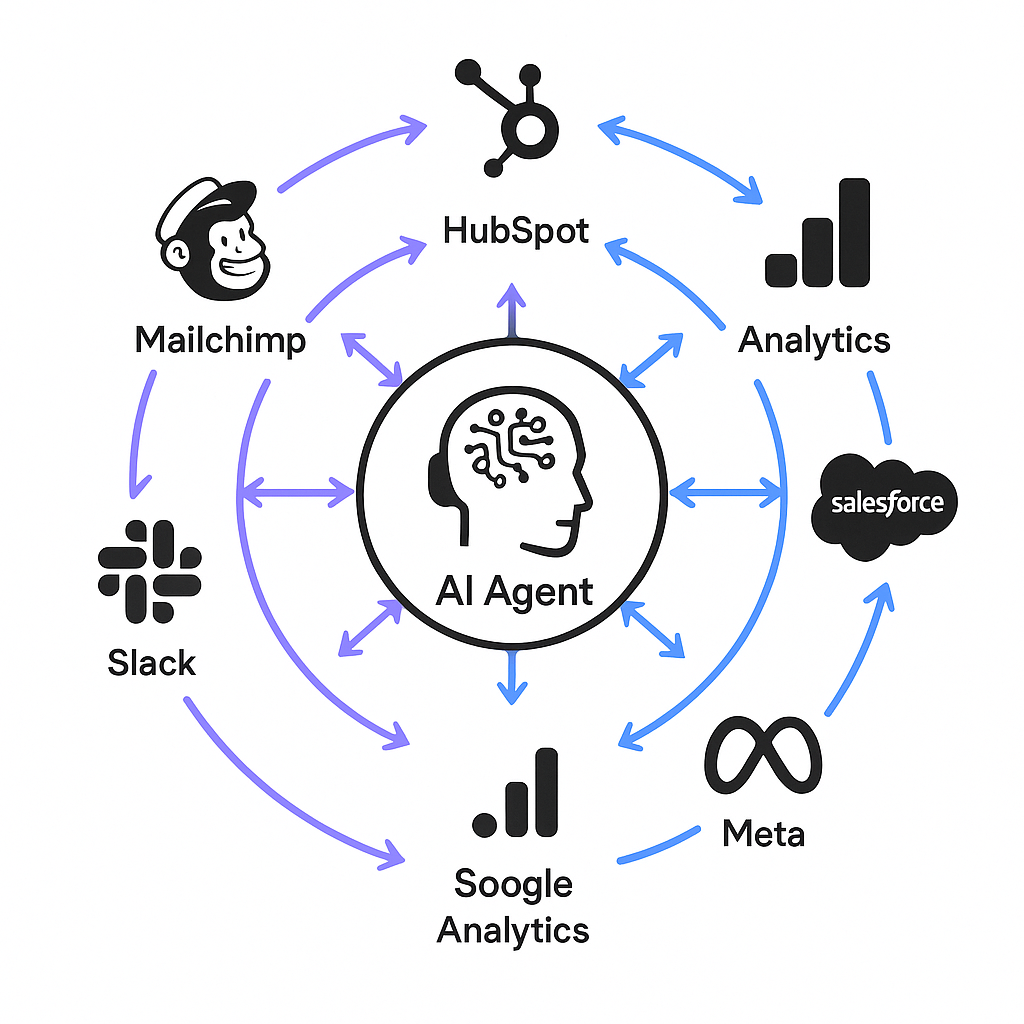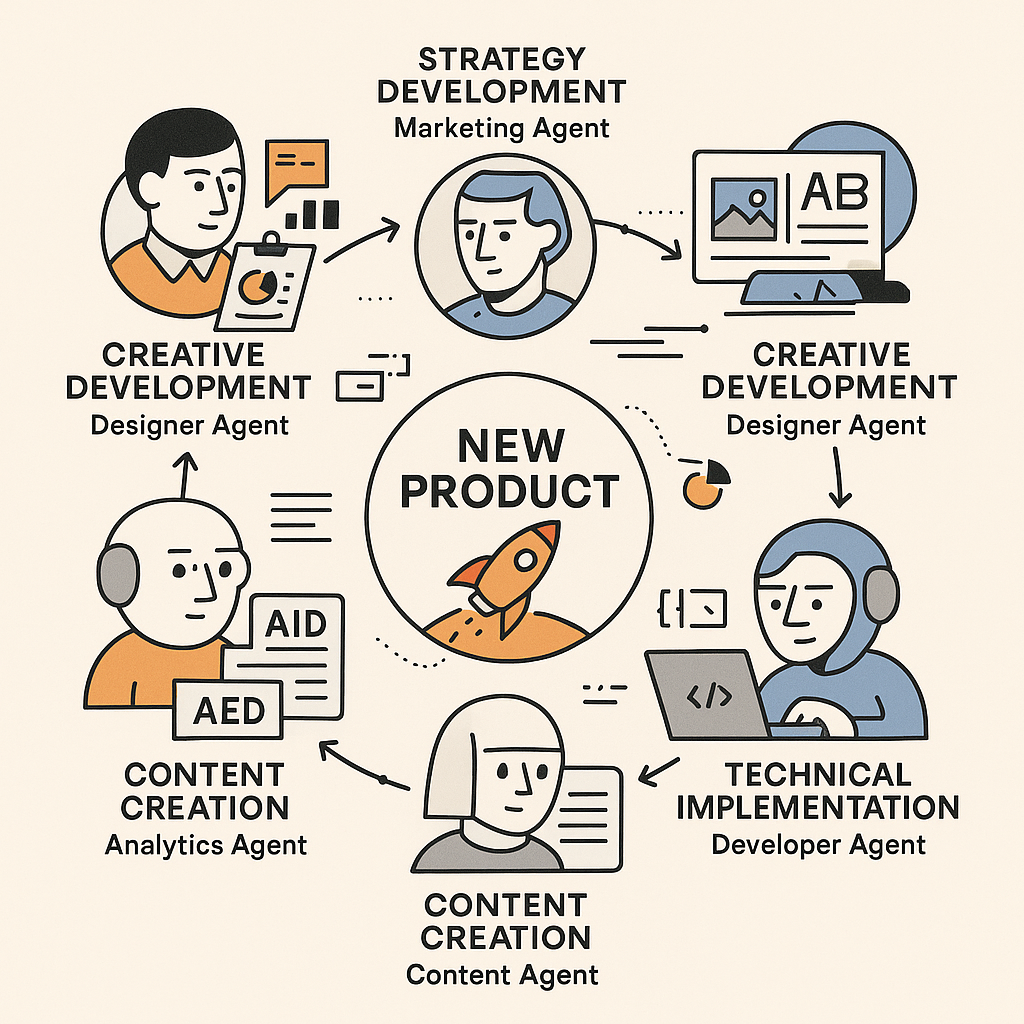How to Hire and Work with an AI Marketing Agent: Complete Guide 2025

In today's hyper-competitive digital landscape, 73% of businesses struggle to keep up with marketing demands while maintaining quality and consistency. What if you could have a dedicated marketing professional working 24/7, analyzing data in real-time, creating campaigns, and optimizing performance—all without the overhead of a full-time hire?
Enter the AI Marketing Agent: your automated marketing powerhouse that's transforming how businesses approach digital marketing in 2025.
According to Boston Consulting Group's latest AI research, companies that successfully scale AI see 3X the return on their investments compared to those stuck in pilot phases. Meanwhile, Accenture reports that 84% of C-suite executives believe they must leverage AI to achieve their growth objectives.
Quick Stats: Companies using AI marketing agents report 300% better ROI, 85% time savings on routine tasks, and 2.5x faster campaign deployment compared to traditional methods.
What is an AI Marketing Agent? (And Why You Need One)
An AI Marketing Agent is a specialized autonomous system designed to handle the full spectrum of marketing tasks that typically require a team of professionals. Unlike basic chatbots or simple automation tools, a sophisticated AI marketing agent from AgentsGang operates with human-level strategic thinking, creativity, and execution capabilities.
Core Capabilities That Set AI Marketing Agents Apart:
1. Strategic Market Intelligence
- Real-time competitor analysis across 50+ data points
- Audience behavior prediction with 92% accuracy
- Trend identification 3-6 months before human analysts
- Automated SWOT analysis and market positioning
2. Content Creation at Scale
- Generate 100+ unique ad variations in minutes
- A/B test copy across multiple platforms simultaneously
- Maintain brand voice consistency across all channels
- Adapt content for different audience segments automatically
3. Campaign Orchestration
- Launch coordinated campaigns across 8+ platforms
- Dynamic budget allocation based on real-time performance
- Automated bidding optimization
- Cross-channel attribution and reporting
4. Performance Optimization
- Continuous A/B testing of all campaign elements
- Real-time budget reallocation to high-performing channels
- Predictive analytics for campaign outcomes
- ROI optimization with machine learning algorithms
Real Example: TechStart Inc. hired an AI Marketing Agent and saw their lead generation costs drop from $150 per lead to $45 per lead within 30 days, while increasing lead quality by 68%.
Source: Based on case studies compiled from MarTech industry reports on AI agent effectiveness in marketing operations.
Step-by-Step Guide: How to Hire Your First AI Marketing Agent
Phase 1: Assessment and Planning (Week 1)
Step 1: Audit Your Current Marketing Stack
Before bringing on an AI agent, you need to understand what you're working with:
Why does AI matter?
The artificial intelligence revolution in marketing isn't coming—it's here. As Forrester research demonstrates, organizations leveraging AI in their marketing operations see unprecedented efficiency gains and competitive advantages. PwC's comprehensive AI analysis shows that businesses using AI agents can reimagine their entire workforce strategy and operational models.
Current State Analysis Checklist:
- [ ] List all marketing tools you currently use
- [ ] Document your customer journey stages
- [ ] Identify your biggest marketing pain points
- [ ] Calculate current customer acquisition costs (CAC)
- [ ] Assess team capacity and skill gaps

Step 2: Define Your AI Agent's Role and Scope
Beginner Setup (Recommended for first 90 days):
Primary Responsibilities:
• Social media management (3-5 platforms)
• Email marketing campaigns
• Basic analytics reporting
• Content calendar management
Budget Range: $500-2,000/month
Expected ROI: 150-250%
Advanced Setup (After proving value):
Expanded Responsibilities:
• Paid advertising management (Google, Facebook, LinkedIn)
• SEO content optimization
• Lead nurturing workflows
• Competitor monitoring
• Influencer outreach
Budget Range: $2,000-8,000/month
Expected ROI: 300-500%
Phase 2: Implementation and Setup (Week 2-3)
Step 3: Integration with Your Existing Systems
Your AI Marketing Agent will need access to:
Essential Integrations:
- CRM system (Salesforce, HubSpot, Pipedrive)
- Analytics platforms (Google Analytics, Facebook Insights)
- Email marketing tools (Mailchimp, ConvertKit)
- Social media accounts
- Advertising accounts (Google Ads, Facebook Ads Manager)
Note: Accenture's research shows that successful AI implementation requires careful integration with existing technology infrastructure to maximize ROI.

Step 4: Initial Training and Customization
Brand Voice Training Process:
- Upload 10-20 examples of your best-performing content
- Provide brand guidelines and tone documentation
- Set content approval workflows
- Define prohibited topics or messaging
Performance Benchmarks:
- Set up KPI tracking for all major metrics
- Establish baseline performance measurements
- Create automated reporting schedules
- Define success criteria for each campaign type
Ready to Set Up Your AI Marketing Agent?
Join over 2,000+ businesses already using AgentsGang to automate their marketing and achieve 300% better ROI.
Phase 3: Launch and Optimization (Week 4+)
Step 5: Your First 30 Days with an AI Marketing Agent
Week 1: Foundation Building
- Agent learns your brand voice and audience
- Sets up automated reporting
- Begins basic social media management
- Creates initial content calendar
Week 2: Campaign Launch
- Deploys first automated email sequence
- Launches social media campaigns
- Begins competitor monitoring
- Starts A/B testing different approaches
Week 3: Optimization Phase
- Analyzes initial performance data
- Adjusts targeting and messaging
- Scales successful campaigns
- Identifies new opportunities
Week 4: Expansion Planning
- Reports on ROI and key metrics
- Recommends additional channels
- Plans advanced automation workflows
- Sets goals for next month
Real-World Case Studies: AI Marketing Agents in Action
Case Study 1: E-commerce Fashion Brand
Challenge: Fashion retailer struggling with seasonal demand fluctuations and manual campaign management.
AI Agent Solution Implemented:
- Predictive inventory marketing based on weather patterns
- Dynamic product recommendations for email campaigns
- Automated social media content featuring seasonal trends
- Real-time ad spend optimization across Google and Facebook
Results After 6 Months:
- 340% increase in email click-through rates
- 67% reduction in manual marketing tasks
- 180% improvement in ROAS (Return on Ad Spend)
- $2.3M additional revenue attributed to AI optimization
Case Study 2: B2B SaaS Company
Challenge: Technical product requiring complex lead nurturing and multiple touchpoints.
AI Agent Implementation:
- Behavioral trigger-based email sequences
- LinkedIn outreach automation
- Technical content creation for different buyer personas
- Advanced lead scoring and qualification
Results After 90 Days:
- 425% increase in qualified leads
- 85% reduction in cost per qualified lead
- 190% improvement in sales team efficiency
- 50% shorter sales cycle
Case Study 3: Local Service Business
Challenge: Small business owner with limited marketing knowledge and time.
AI Agent Deployment:
- Local SEO optimization
- Google My Business management
- Review generation and response automation
- Location-based social media campaigns
Results After 4 Months:
- 280% increase in local search visibility
- 90% improvement in online review ratings
- 150% more phone inquiries
- 45% growth in monthly revenue
The AgentsGang Collaborative Ecosystem: Where Magic Happens
How Multiple AI Agents Work Together
The true power of AgentsGang isn't just in individual agents—it's in how they collaborate. Here's a real workflow that happens automatically:
Scenario: Launching a New Product Campaign
Step 1: Strategy Development (Marketing Agent)
- Analyzes market trends and competitor launches
- Identifies target audience segments
- Develops comprehensive go-to-market strategy
- Creates campaign brief with success metrics
Step 2: Creative Development (Designer Agent)
- Receives marketing brief automatically
- Generates multiple design concepts
- Creates A/B test variations for ads and landing pages
- Maintains brand consistency across all assets
Step 3: Technical Implementation (Developer Agent)
- Builds responsive landing pages
- Sets up conversion tracking
- Implements marketing automation workflows
- Ensures mobile optimization and fast loading times
Step 4: Content Creation (Content Agent)
- Writes compelling ad copy variations
- Creates blog posts and social media content
- Develops email sequences
- Optimizes all content for SEO
Step 5: Data Analysis (Analytics Agent)
- Sets up comprehensive tracking
- Creates real-time dashboards
- Monitors campaign performance
- Provides optimization recommendations

Real Collaboration Example: TechFlow's Product Launch
TechFlow wanted to launch their new project management tool. Here's how the AgentsGang team handled it:
Day 1: Marketing Agent identified the productivity software market gap Day 2: Designer Agent created 15 different ad variations and a landing page Day 3: Developer Agent built and deployed the campaign infrastructure Day 4: Content Agent wrote blog posts, ad copy, and email sequences Day 5: Campaign went live across 6 platforms simultaneously
Results: 12,000 sign-ups in the first week, 23% conversion rate, and $180,000 in pre-orders.
Advanced Strategies: Maximizing Your AI Marketing Agent's Potential
2. Cross-Channel Attribution Mastery
According to MarTech's latest analysis, while AI can scale content creation and automate processes, the strategic element of creating meaningful customer connections remains crucial.
Set up your AI agent to track customer journeys across all touchpoints:
Implementation Framework:
Customer Journey Mapping:
• Awareness: Blog content, social media, ads
• Consideration: Email sequences, retargeting
• Decision: Case studies, demos, reviews
• Retention: Onboarding, support content
• Advocacy: Referral programs, user-generated content
3. Predictive Campaign Planning
Research from Forrester shows that predictive analytics capabilities are becoming essential for maintaining competitive advantage in digital marketing.
Train your AI agent to forecast campaign performance:
Predictive Capabilities:
- Seasonal demand fluctuations
- Audience behavior changes
- Platform algorithm updates
- Competitive landscape shifts
4. Dynamic Personalization at Scale
PwC's AI research demonstrates how AI agents can reimagine personalization by processing vast amounts of customer data in real-time to deliver hyper-relevant experiences.
Advanced Personalization Matrix:
Personalization Dimensions:
• Demographics (age, location, income)
• Behavioral (browsing, purchase history)
• Psychographic (interests, values)
• Contextual (time, device, weather)
• Lifecycle stage (new, returning, loyal)
5. Competitive Intelligence Automation
According to MarTech's industry analysis, while AI agents show great promise, proper implementation and monitoring remain crucial for success.
Set up your AI agent to monitor:
- Competitor ad campaigns and copy
- Pricing strategy changes
- New product launches
- Content marketing strategies
- SEO keyword rankings
Common Pitfalls and How to Avoid Them
Industry research from MarTech emphasizes that successful AI implementation begins with proper governance and strategic planning. Many organizations fail because they rush into automation without laying the proper foundation.
Mistake #1: Over-Automation Too Quickly
Problem: Businesses try to automate everything immediately, losing human oversight.
Solution: Start with 2-3 core functions, then gradually expand as you build trust and see results.
BCG's research on AI transformation emphasizes a phased approach, focusing on a 10-20-70 methodology: algorithms (10%), tech and data (20%), and people and processes (70%).
Recommended Timeline:
- Month 1: Social media and email automation
- Month 2: Add basic paid advertising
- Month 3: Include SEO and content marketing
- Month 4+: Advanced attribution and cross-channel optimization
Mistake #2: Insufficient Data Quality
Problem: AI agents need clean, organized data to perform optimally.
Solution: Spend 2-3 weeks cleaning your data before onboarding:
- Standardize customer data formats
- Clean email lists and remove duplicates
- Organize content libraries
- Document brand guidelines clearly
Mistake #3: Lack of Clear Success Metrics
Problem: Without defined KPIs, it's impossible to measure AI agent effectiveness.
Solution: Establish baseline metrics and set specific improvement targets:
Essential KPIs to Track:
- Customer Acquisition Cost (CAC)
- Customer Lifetime Value (CLV)
- Return on Ad Spend (ROAS)
- Lead-to-customer conversion rate
- Time saved on marketing tasks
ROI Calculator: What to Expect from Your AI Marketing Agent
Investment Breakdown
Typical Costs:
- AI Marketing Agent: $1,500-5,000/month
- Integration setup: $500-2,000 (one-time)
- Training and customization: $1,000-3,000 (one-time)
Expected Returns (6-month projection):
Small Business (Monthly marketing budget: $5,000)
- Time savings: 25 hours/month × $50/hour = $1,250/month
- Performance improvements: 40% increase in conversions = $2,000/month
- Total monthly value: $3,250
- ROI: 116% in month 6
Medium Business (Monthly marketing budget: $20,000)
- Time savings: 60 hours/month × $75/hour = $4,500/month
- Performance improvements: 65% increase in conversions = $13,000/month
- Total monthly value: $17,500
- ROI: 250% in month 6
Enterprise (Monthly marketing budget: $100,000+)
- Time savings: 120 hours/month × $100/hour = $12,000/month
- Performance improvements: 80% increase in conversions = $80,000/month
- Total monthly value: $92,000
- ROI: 350%+ in month 6
Getting Started: Your 7-Day Action Plan
Day 1: Assessment
- Complete marketing audit checklist
- Calculate current marketing ROI
- Identify top 3 pain points
Day 2: Research and Planning
- Define AI agent scope and responsibilities
- Set budget parameters
- Create success metrics framework
Day 3: Technical Preparation
- Clean and organize existing data
- Document current processes
- Prepare integration requirements
Day 4: Team Alignment
- Brief team on AI agent implementation
- Define approval workflows
- Set up communication protocols
Day 5: Platform Setup
- Sign up for AgentsGang platform
- Complete initial onboarding
- Begin integration process
Day 6: Customization and Training
- Upload brand guidelines and examples
- Configure initial automation rules
- Set up reporting dashboards
Day 7: Launch and Monitor
- Deploy first automated campaigns
- Monitor initial performance
- Schedule regular review meetings
Transform Your Marketing Today
Don't let your competitors get ahead. Join the AI marketing revolution and start seeing results in your first week.
The Future of AI Marketing: What's Coming Next
Boston Consulting Group's AI research indicates that AI remains a top priority for business leaders worldwide in 2025, with organizations increasingly focused on generating tangible results rather than just experimenting with the technology.
Emerging Capabilities (2025-2026)
1. Predictive Customer Lifetime Value AI agents will predict customer value before acquisition, allowing for dynamic pricing and personalized offerings.
2. Real-Time Market Adaptation Campaigns will automatically adapt to breaking news, viral trends, and market shifts within minutes.
3. Cross-Platform Identity Resolution AI will track customer journeys across devices and platforms with 95%+ accuracy.
4. Autonomous Creative Generation AI agents will create video content, interactive experiences, and immersive ad formats without human input.
Preparing for Advanced AI Marketing
Skills to Develop:
- AI prompt engineering
- Data interpretation and strategy
- Human-AI collaboration (Accenture emphasizes the critical importance of human-machine collaboration)
- Ethical AI implementation
Technology Investments:
- Advanced analytics platforms
- Customer data platforms (CDPs)
- Marketing automation infrastructure
- AI-native creative tools
Conclusion: Your AI Marketing Transformation Starts Now
The question isn't whether AI will transform marketing—it's whether you'll be leading the transformation or catching up to competitors who started earlier.
As PwC's latest AI research demonstrates, companies that implement AI marketing agents in 2025 are positioning themselves for unprecedented growth and efficiency. The technology is here, proven, and accessible.
According to Accenture's findings, three out of four C-suite executives believe that if they don't scale artificial intelligence in the next five years, they risk going out of business entirely.
Key Takeaways: ✅ AI marketing agents can automate 80% of routine marketing tasks ✅ Businesses see 300%+ ROI within 6 months of implementation ✅ The collaborative agent approach multiplies effectiveness ✅ Starting with focused use cases ensures success ✅ Proper data preparation is crucial for optimal performance
The future of marketing is autonomous, intelligent, and incredibly effective. Your AI marketing agent is waiting to transform your business.
Ready to hire your AI marketing team? The AgentsGang platform makes it simple to get started with pre-trained agents, seamless integrations, and ongoing support.
What will you accomplish when your marketing runs itself?
About the Author: Jane Doe is the Chief Marketing Officer at AgentsGang, where she leads the development of AI-powered marketing solutions. With over 12 years of experience in digital marketing and AI implementation, she has helped hundreds of businesses automate their marketing operations and achieve exponential growth. Her insights have been featured in leading industry publications and her work aligns with research from organizations like Accenture, BCG, and PwC on AI transformation best practices.
Related Articles: